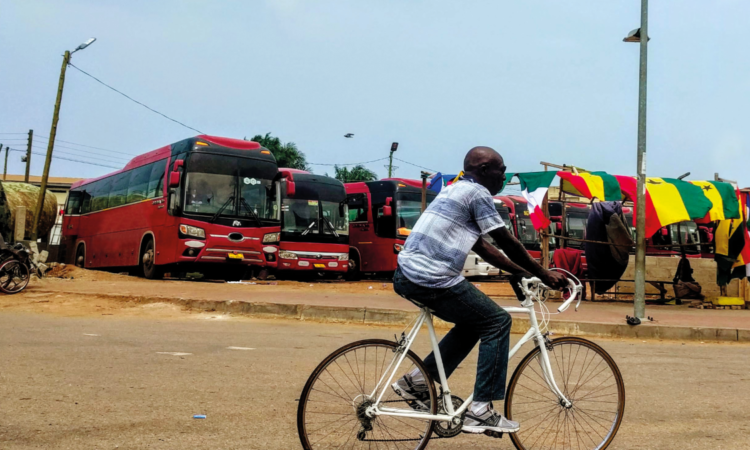WHO Urban Health Initiative releases report on sustainable transport in Ghana – World Health Organization (WHO)

The report, “Health and economic impacts of transport interventions in Accra,” shows how premature deaths can be averted through a multi-sectoral approach towards sustainable transport.
24 March 2021 — A new report by WHO’s Urban Health Initiative has found that sustainable modes of transport in Accra, Ghana could save up to 5500 premature deaths with improvements to air quality, and an additional 33,000 lives from increased physical activity over a 35 year period, for an estimated USD15 billion in health economic benefits.
According to the report titled, “Health and economic impacts of transport interventions in Accra,” the numbers could be attained through greater access to greener vehicles for citizens and increased walking and cycling infrastructure, while also developing a more comprehensive and decarbonized public transportation system.
Emissions from transport represent a major problem for cities around the world, particularly in developing countries that are witnessing rapid urbanization. Upsurges in vehicles are the fastest growing contributor to climate emissions and energy use. In 2010, the global transport sector accounted for 14% of the greenhouse gas (GHG) budget, and contributed to climate change through long-lived carbon dioxide and short-lived black carbon from diesel vehicles.
“One of the best overall ‘indicators’ of a healthy or unhealthy city is air quality,” said Dr. Maria Neira, WHO Director of Environment, Climate Change and Health. “This is because air pollution levels are typically low in well-planned cities with good transport systems, walkable streets and ample green spaces to filter the air. Air pollution levels soar in urban settings that prioritize road transport over pedestrians and cyclists, and that allow uncontrolled sprawl in large, grey, unbroken blocs of asphalt and concrete.”
The UHI report aims to support national and city level governments, such as Accra in the use of health impact assessment tools to assess the environmental, health and economic co-benefits of future sustainable urban transportation. The iSThAT (expected to be released in 2021) is an Excel-based tool for calculating the health benefits of reduced urban air pollution and increased physical mobility. It provides economic valuations of alternative transport too.
Policy measures emphasize investments and incentives that move away from conventional fossil fuels to more environmentally friendly alternatives. They also look at sustainable land-use planning and controlled development; encouraging walking and cycling instead of driving; sustainable public transportation systems; and implementing car-sharing and car-pooling schemes.
Accra is one of the fastest growing cities in Africa, with an annual population increase of around 2%. More than 4.5 million people live in its metropolitan area, with a daily influx of 2.5 million business commuters. The population is expected to grow to 9.6 million by 2050 with a three-fold increase in demand for transport. Personal car ownership is projected to double and there will be greater use of the public transport system under this business-as-usual scenario.
In the report, the UHI examined three mitigation scenarios that compared the effects of different policy interventions with regard to land use, mode of transport, energy efficiency and demand, with the relative impacts on public health and cost.
Using the assessment tool, decision makers in Accra looked at the health impacts on the exposed population in terms of deaths and the equivalent years of lost life (YLL) as well as lost workdays, hospital admissions and incidences of respiratory diseases.
They also looked at economic health benefits and health costs over time, along with a comparison of carbon emissions under different scenarios, which were then valued in terms of financial and environmental cost, relative to climate change. Finally, they examined the health benefits of active travel using the methodology of the WHO HEAT (Health Economic Assessment Tool for walking and cycling).
The estimates of the health and economic impacts of the alternative and green transport scenarios for Accra, would allow policy-makers to make data-informed decisions on whether planned transport projects are likely to prevent diseases and deliver health gains while achieving sustainability goals over the medium to long term.
“We should look at the type of ideal city we want to have and integrate tools which take into consideration the full range of health benefits that can be achieved when planning that city’s mobility,” said Dr. Thiago Herick de Sa, a WHO Technical Officer and an expert in Urban Health and Sustainable Mobility. “Healthy sustainable mobility systems are the ones that prioritize walking, cycling and public transport.”
Related
Health and economic impacts of transport interventions in Accra, Ghana







